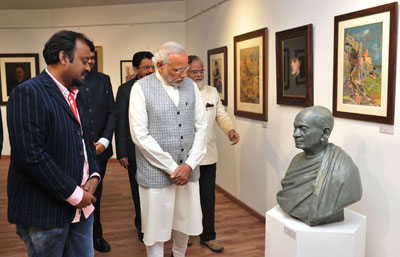
The Prime Minister, Shri Narendra Modi viewing paintings and sculptures during inauguration of new building complex of Bombay Art Society, in Mumbai on February 13, 2016.MUMBAI, Feb 13:
Noting that art transcends time, race and religious barriers, Prime Minister Narendra Modi today pitched for bringing art closer to the common man and using it to spread social messages on issues like ‘Swachch India’ as it has more appeal than spoken words.
He said art should not remain restricted to the walls of rich people but become the strength of the society.
Addressing a gathering after inaugurating the new building of the Bombay Art Society in suburban Bandra, he said empty space at railway platforms can be used to allow budding artists to display their skills. This, he said can also be used to spread social messages.
“Art”, Modi said, “has better appeal than speeches”. He said any art on the issue of sanitation and cleanliness will have more appeal than speeches made by people.
He also called for developing ‘digital version’ of creative works so that future generations can understand the process by which a piece of art is created.
“When we say art, A stands for ageless, R stands for Race, Region and religionless and T stands for Timeless… Art is ageless, religionless and timeless”, Modi said.
He said art should not be dependent on the State for support and funding, but on the other hand it should be honoured by the State.
“Last time I spoke in my Mann ki Baat programme that artists are giving their time and through their artworks, are changing the whole ambience of railway stations in the country.
“This is not a government scheme and neither any budget allocated for that. But, artists have taken it upon themselves and it is having such a good effect. More than giving speech on ‘Swacch Bharat’ it better to create art works that would inspire people keep India clean,” Modi said.
He said to suit the coming generations, artworks should be developed using the digital hybrid world.
“For example, when an work was created, how did the thought first come to artist’s mind? How did it then materialise on paper or canvas over a period of time. A 3-4 minute digital version of the whole process. When any person sees the artwork, he should also see a digital version of the process with musical effects,” he said.
Modi said today a person with the knowledge of arts needs to be present to make the viewer understand it.
“To change this, digital world can be used. I want people associated with software and IT world to take interest in this and give a new power to artists,” Modi said.
Emphasising on the need to cultivate the taste for art at a young age, he said the excursions planned by schools should include visit to art galleries.
“I suggest to schools that when they make annual tour programmes, at least once a year they should make a programme of viewing an art gallery. Similarly, I have also told the Railway department, to make an art gallery on railway platforms. That way, artists from the area will also get a place to showcase their works,” Modi said.
Underlining the importance of art, Modi said temples are an example of this. “There, you see gods and art together,” he said.
Urging parents to allow their children express freely through art, he said often mothers ask their children to recite a rhyme to guests. “But there are a very few mothers who ask their children to show the drawing they have made…,” he said.
Maharashtra Chief Minister Devendra Fadnavis and NCP supremo Sharad Pawar were also present on the occasion.
Modi said art is “the only tool” that can save our generations from turning into robots.
“Our life is maximally opened to technology, hence we should be cautiously trying to keep our upcoming generations as human as possible by preventing them from turning into robots … And therefore art is the only tool that can save our generations from turning into robots.” he said
“We should ponder whether art is merely a tool to beautify our wall or wardrobes, or this a power of our society. And if we think that this is merely a tool to beautify the our walls, then we are miles away from art. To change this, we need to press for its continuous education to inculcate its values,” the PM added.
Modi also differed with Bombay Aart Society President Vasudev Kamat’s view that art should be dependent on state patronage.
“I don’t agree that art should be state-promoted. Rather I think art should be state-awarded. It should not have any limitation and restrictions. This is the responsibility of the state to award it and I thank Sharad Pawar ji who allotted the land to the society when he was the Chief Minister of the state.” (PTI)

